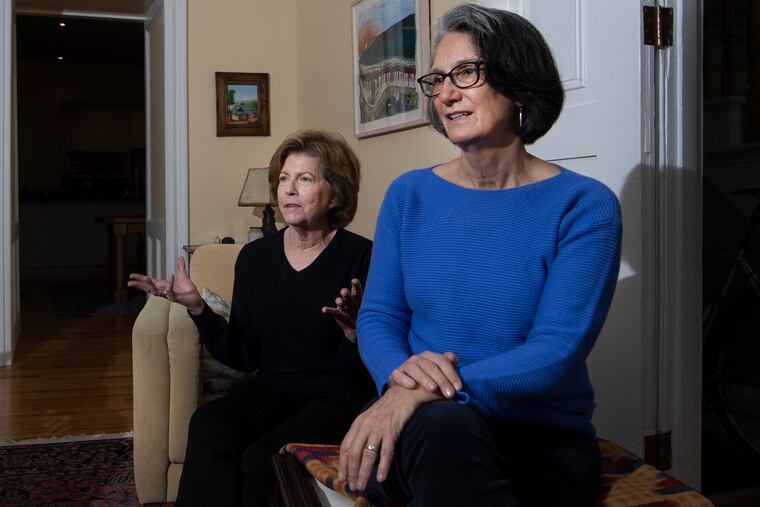Philly documentary makers return to an enduring source of inspiration: Abortion
What often is overlooked is the fact that the ban places an outsized burden on women who are already struggling, especially African American women. That aspect is concisely captured in "Abortion Helpline: This is Lisa," a new documentary by award-winning filmmakers Barbara Attie and Janet Goldwater.

In 1976, Henry J. Hyde, then a Republican congressman from Illinois, argued that federal Medicaid funds should not pay for abortion. It was just three years after Roe v. Wade, the landmark ruling that made abortion access a constitutional right. Hyde knew that banning funding would affect low-income women.
“Mr. Chairman, we cannot save the unborn children of the rich,” Hyde said in a C-SPAN clip. “Thank God, we can save some of the children of the poor.”
The federal government and 33 states, including Pennsylvania, now prohibit Medicaid from covering abortion except in cases of rape or incest, or to save the woman’s life. Polls show that 57% of Americans support the Hyde Amendment.
But what often is overlooked is the fact that the ban places an outsize burden on women who are already struggling, especially African American women. That aspect is concisely captured in Abortion Helpline: This Is Lisa, a new documentary by award-winning filmmakers Barbara Attie, Janet Goldwater, and Mike Attie that will be previewed at the Sundance Film Festival starting onFriday. It shows counselors at the Women’s Medical Fund — Philadelphia’s version of similar charities that dot the country — responding to calls from women and teens too poor to afford roughly $400 to end a pregnancy.
At 13 minutes, Helpline is the shortest documentary Attie and Goldwater have made in their four decades of exploring complex health and social justice issues facing women. Helpline returns to the bitterly divisive issue that inspired four of their earlier documentaries, including Motherless: A Legacy of Loss From Illegal Abortion and Rosita, about the struggle to get an abortion for a 9-year-old girl raped in Costa Rica.
The filmmakers, interviewed on Monday at Goldwater’s home in Philadelphia’s Fairmount neighborhood, said that they were inspired by the 2016 election of President Donald Trump, who switched from a pro-abortion-rights stance to antiabortion.
“We wanted to do something that speaks to the political moment and that we could do quickly,” Goldwater said. “Little did we know it would take as long to make as a feature-length film.”
While the new film is unabashedly pro-choice (and already bringing donations to the Women’s Medical Fund), it is not a polemic. It intersperses archival footage of congressional debate over the Hyde Amendment — including Hyde’s remark about rich and poor women — with calls to the helpline. The film doesn’t mention it, but the Women’s Medical Fund last year tallied 4,050 callers and provided 3,280 of them — most already mothers — with an average of $131 to pay for an abortion.
Some callers must be turned away because the counselors, who all go by the name Lisa, have a fixed amount of money, not specified in the film, to give away each shift. A woman with three children, a clerical job, and relatives who refuse to help her says she has only $125 in savings.
“That leaves $275, which is more than we can cover today,” the counselor gently tells her.
“Originally,” Attie said, “we thought we’d just have the counselors’ voices and show them typing on a computer screen, but we quickly decided we needed to hear the women’s voices.”
That meant hiring a lawyer to develop an informed-consent process to preserve callers’ confidentiality if they agreed to participate, and assure them that funding would not be affected if they didn’t.
Goldwater, 69, who is a past member of the Medical Fund’s board, and Attie, 71, a former Planned Parenthood board member, were toying with retirement after making BaddDDD Sonia Sanchez, their acclaimed 2016 commemoration of the Philadelphia poet, educator, mother, and activist. They were tired of chasing grants and distribution opportunities.
They managed to do the latest project for about $17,500 — modest even for a pair used to shoestring budgets — thanks to labor donated by Attie’s son, Mike, the University of the Arts’ film program director, and his students.
A graduate of Stanford University’s documentary filmmaking program, Mike Attie became “obsessed” with editing Helpline to convey the small scale of the women’s immediate financial needs and the precariousness of their situations. One caller is a diabetic mother who lost her job as a power company tree-trimmer. Another, who is living on disability insurance in a domestic-abuse shelter with her two children, faces a higher cost for the abortion if she goes another week.
“Sometimes, when you give to a good cause, you feel like your donation doesn’t really have an impact,” Mike Attie said. “But with the helpline, you see that giving just $25 can make a real difference to a woman.”
In rare cases, callers with public insurance — or no health insurance — need a costly, late-term, hospital abortion because of a fetal defect. The film’s final vignette involves a woman whose fetus lacks most of his brain, a birth defect called anencephaly.
“The operation costs $3,000. I don’t have that much,” the woman says, crying. “They said if I keep him in my stomach, he’s going to die anyway.”
All three filmmakers have received funding in the past from the Sundance Documentary Fund, but the coveted, prestigious honor of having work screened at the festival has eluded them — until now. Helpline is an official selection of the 2020 festival.
“Sundance is opening so many doors for us. Film festivals all over the world are soliciting us, rather than us soliciting them,” Goldwater said.
The documentary will also be screened by the Women’s Medical Fund on Tuesday, Jan. 21, at the Philadelphia Free Library to mark the anniversary of Roe v. Wade — a decision now considered to be at risk because of Trump’s Supreme Court appointments.